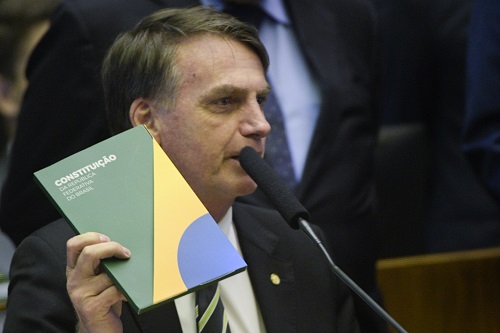Senado photo
By
Ricardo Swire
Brazil’s president-elect Jair Bolsonaro and his Cabinet’s new policies have started a tug of war between the Judiciary and Military. In November 2018, Augusto Heleno, a retired General was appointed Secretary of Institutional Security. The former senior Army officer previously served as Vice President and Defense Minister. Such popularity over shadowed the Justice Minister and Police Chief appointments.
In February 2018 the president-elect craftily tabled a bill that modified legislator protections for security forces personnel accused of “unlawful” use of force. The former Army paratrooper and Congressman turned president-elect subtly defends Brazil’s 1960s to 1980s military dictatorship’s aggressive crime fighting successes. His formal Security Strategy has assigned more autonomy to security forces personnel conducting organized crime fighting operations.
One report confirmed two of Brazil’s most powerful criminal entities recently ended their three year truce. Crime and violence in related districts are forecasted to mushroom. In 2015 the Rio de Janeiro headquartered Red Command and “Mano G,” or ex-leader of Familia Do Norte (FDN) based in the Manaus, agreed to jointly manage Solimoes River activity. The watercourse is specially used as a cocaine pipeline from Colombia and Peru to Brazil.
The 2015 gang truce exploded when Mano G deserted the FDN and joined Red Command. This rift set the stage for First Capital Command (Primeiro Comando da Capital – PCC), Brazil’s most powerful criminal organization, to monopolize the Solimoes River trafficking route. The PCC and Red Command once shared access to another valuable channel in southern Brazil used to import cocaine from Bolivia.
In June 2016, after narco trafficker Jorge Rafaat Toumani was murdered, the PCC assumed complete control of such route. The Red Command was forced to shop for cocaine supplies northward in Colombia and Peru. When put to the litmus test Brazil’s president-elect’s political plans and promises for public safety do not address “underworld dynamics” that propel Brazil’s violence.
During the president-elect’s political campaign he declared “police who kill suspects, in the line of duty, should not be scrutinized but instead given awards.” An independent national security and safety review found less than ten percent of Brazil’s murders are solved. In Rio de Janeiro investigations are only started for four percent of robbery cases. In ninety-six percent no follow-up probes occur.
Ricardo Swire
Ricardo Swire is the Principal Consultant at R-L-H Security Consultants & Business Support Services and writes on a number of important issues.



No Comments Yet!
You can be first to comment this post!